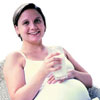A bit of magic: Feed your baby before you conceive!
We’ve all heard the saying, "You are what you eat." While we all know it’s not true in the literal sense (no one has ever turned into a cow after a good steak!), we all know that what we eat influences our health. But did you know that what a woman eats also influences the health of her foetus – even before she is pregnant?
But I’m not pregnant yet!
Wondering how your pre-pregnancy diet can influence the health of your baby during pregnancy? Read on.
When a woman falls pregnant, the foetus begins growing very quickly. At this stage there are no obvious signs of pregnancy like a baby bump or morning sickness, and the women is usually unaware she has a bun in the oven. However, the cells of the foetus (which started as a single sperm and egg) reproduce rapidly at this stage. In order to reproduce, the cells require nutrients, which are taken from the woman’s nutritional stores.
Women who have maintained a good diet before falling pregnant will typically have enough stores of energy and micronutrients (e.g. calcium, iron, folate) to support the growing foetus. But these nutrients may be insufficient if the woman has nutritional problems (e.g. a deficiency in folate) before she gets pregnant. This can affect the development of the foetus in the womb, and also the health of the baby after birth.
I don’t even know if I’m pregnant. How can my diet affect my baby?
Some of the most important aspects of foetal development occur before a woman realises she’s pregnant. For example, it is in the very early stage of pregnancy (the first four weeks) that the neural tube of the foetus develops – this is the tube that forms the spine and controls the nervous system. Abnormalities in the neural tube can significantly affect the health of the baby. For example, it can cause conditions such as spina bifida and mental retardation.
Deficiencies in other micronutrients (vitamins and minerals) and macronutrients (energy) can also affect the development of the foetus before a woman realises she’s pregnant. For example, calcium deficiency in the mother might affect the growing baby’s bones and teeth. If she is malnourished (energy-deficient because she does not consume enough calories), her baby may not grow enough and may be born too small (weighing < 2.5 kg).
Stores of energy and micronutrients need time to build up – that’s why maintaining a good diet before pregnancy is so important.
Programming the next generation
But wait, there’s more! It’s not enough to eat well before pregnancy.
You’ve probably already guessed that a healthy diet throughout the pregnancy is just as important, as the foetus is constantly growing and requires constant supplies of energy and micronutrients. Without proper nutrient supplies, some of the baby’s organs may fail to develop properly, or the baby may not grow big enough.
But did you know that what you eat while you’re pregnant also influences the food preferences of your baby? It’s called the foetal programming effect and, as the name suggests, a woman actually programs her foetus – for example, to like certain foods more than others. If you eat lots of fat and sugar while you’re pregnant, your baby is likely to have a preference for high fat, sugary foods after birth. On the other hand, if you consume a low fat, low sugar diet with lots of fruit and veges, you’re programming your foetus’s nervous system to like healthy, nutritious food.
Healthy eating: Not always as easy as ABC
But healthy eating is not always as easy as it sounds! Vegan women have difficulty sourcing all their micronutrients from their diets because they don’t eat animal products (the key sources of protein, calcium and other micronutrients). Other women may also have trouble maintaining a healthy diet if they have allergies to certain foods or have difficulty accessing food (e.g. because they live in a remote place or don’t have enough money).
Need a helping hand?
There are many sources of help for women who find maintaining a healthy diet whilst pregnant a challenge. Health professionals, including nutritionists and dietitians, can give advice about what and how much pregnant women should eat. Numerous organisations can help women access food if they find this a challenge. General practitioners can provide nutritional supplements (e.g. folate supplements are often given to women before they fall pregnant).
So don’t be afraid to ask for help. While eating is a simple part of everyday life, eating properly can be challenging. Women who face this challenge will not only protect their own health, but will also optimise the health of their baby.
More information
 | For more information, see Importance of Healthy Eating Before and During Pregnancy. |
Dates
Created by:

 Login
Login














